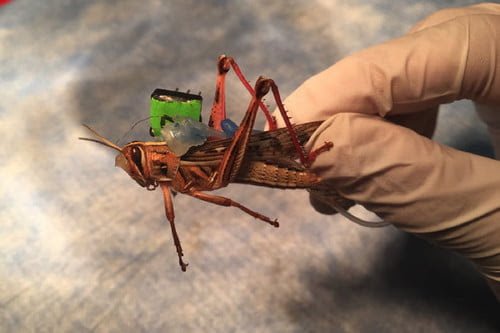Blog entry by Bruce McPherson

Baranidharan Raman
Everyone’s familiar with sniffer dogs at airports, but how about bomb-sniffing grasshoppers? It sounds crazy, but that’s the mission researchers at Washington University in Missouri have been working toward. And it’s a whole lot less science-fiction-based than you might think.
Digital Trends first wrote about Washington University’s backpack-wearing cyborg locust project in 2016. At the time, Baranidharan Raman, associate professor of biomedical engineering, described the goal as being a “bridge between neuroscience and engineering.” Back then, the project had just received funding from the Office of Naval Research to make its insect-army dream a reality.
Now, approaching half a decade later, the researchers have written a paper describing their progress that’s currently available on the open-access preprint biology server bioRxiv. Titled “Explosive sensing with insect-based biorobots,” it reveals that the team has demonstrated a “biorobotic chemical-sensing approach where signals from an insect brain are directly utilized to detect and distinguish various explosive chemical vapors.”
In short, they built a “mobile multi-unit electrophysiological recording system” and implanted it, via a minimally invasive surgical approach, into locusts. This allowed them to “tap into the neural signals in a locust brain” so that it would react whenever it was exposed to select explosive chemical species, such as dinitrotoluene (DNT) or trinitrotoluene (TNT). In their paper, the researchers note how target chemical recognition can be achieved within a “few hundred milliseconds of exposure.” It can also distinguish between the different chemical species the locust is programmed to react to.
While the idea of using locusts might seem fanciful, the researchers suggest that there is a good reason for this. Researchers have tried building “electronic noses” for accurate sniff-related tasks. However, these are still quite limited. The concept of a “hybrid bi0electronic solution” is that it takes advantage of the sophisticated olfactory sensors that exist even in creatures as relatively simple as a locust. The end result, the Washington University investigators say, is a “cyborg chemical-sensing” system.
There’s no word on when this system will be rolling out into the real world. But it certainly sounds like progress has been made on the project. And, hey, cyborg insect bomb-detectors is the kind of tech that’s worth waiting for!
By Luke Dormehl